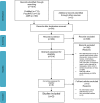A systematic review of online interventions for mental health in low and middle income countries: a neglected field
- PMID: 28596860
- PMCID: PMC5269629
- DOI: 10.1017/gmh.2015.10
A systematic review of online interventions for mental health in low and middle income countries: a neglected field
Abstract
Background: Low and middle income countries (LMICs) are facing an increase of the impact of mental health problems while confronted with limited resources and limited access to mental health care, known as the 'mental health gap'. One strategy to reduce the mental health gap would be to utilize the internet to provide more widely-distributed and low cost mental health care. We undertook this systematic review to investigate the effectiveness and efficacy of online interventions in LMICs.
Methods: We systematically searched the data-bases PubMed, PsycINFO, JMIR, and additional sources. MeSH terms, Thesaurus, and free text keywords were used. We included all randomized controlled trials (RCTs) of online interventions in LMICs.
Results: We found only three articles reported results of RCTs on online interventions for mental health conditions in LMICs, but none of these interventions was compared with an active control condition. Also, the mental health conditions were diverse across the three studies.
Conclusions: There is a dearth of studies examining the effect of online interventions in LMICs, so we cannot draw a firm conclusion on its effectiveness. However, given the effectiveness of online interventions in high income countries and sharp increase of internet access in LMICs, online interventions may offer a potential to help reduce the 'mental health gap'. More studies are urgently needed in LMICs.
Keywords: Interventions; low-middle income countries; mental health; mental health gap; online interventions.
Figures
References
-
- Andersson G, Cuijpers P (2009). Internet-based and other computerized psychological treatments for adult depression: a meta-analysis. Cognitive Behaviour Therapy 38, 196–205. - PubMed
-
- Christensen H (2010). Increasing access and effectiveness: using the internet to deliver low intensity CBT In Oxford Guide to Low Intensity CBT Intervention (ed. Bennett-Levy J., Richards D. A., Farrand P., Christensen H., Griffiths K. M., Kavanagh D. J., Klein B., Lau M. A., Proudfoot J., Ritterband L., White J. and Williams C.), pp. 53–68. Oxford University Press: Oxford.
LinkOut - more resources
Full Text Sources
Other Literature Sources
Miscellaneous

